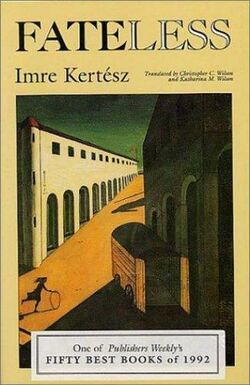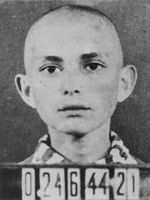Imre Kertész (M / Hungary, 1929-2016), Holocaust survivor
Imre Kertész (M / Hungary, 1929-2016), Holocaust survivor.
- First Hungarian to win the Nobel in Literature in 2002.
- KEYWORDS : <Hungary> <Auschwitz> <Buchenwald> <Liberation of Buchenwald>
- MEMOIRS : Fateless (1975; ET 1992) -- See Fateless (film, 2005), by Lajos Koltai.
Biography
Imre Kertész was born November 9, 1929 in Budapest, Hungary to a Jewish family. During World War II, Kertész was deported in 1944 at the age of 14 with other Hungarian Jews to the Auschwitz concentration camp, and was later sent to Buchenwald. Upon his arrival at the camps, Kertész claimed to be a 16-year old worker, thus saving him from the instant extermination that awaited a 14-year old. After his camp was liberated in 1945, Kertész returned to Budapest, graduated from high school in 1948, and then went on to find work as a journalist, translator, and novelist. He told his story during the Holocaust in a semi-autobiographical novel Fateless (1992). Kertész won the Nobel Price in Literature in 2002. In 2005 he wrote the script of a movie, that he made even closer to his own personal experience. He died on 31 March 2016, aged 86, in Budapest, Hungary.
Book: Fateless (1975)
- Sorstalanság <Hungarian> (1975). English trans. Fateless / Fatelessness (1992).
At the age of 14 Georg Koves is plucked from his home in a Jewish section of Budapest and without any particular malice, placed on a train to Auschwitz. He does not understand the reason for his fate. He doesn’t particularly think of himself as Jewish. And his fellow prisoners, who decry his lack of Yiddish, keep telling him, “You are no Jew.” In the lowest circle of the Holocaust, Georg remains an outsider. The genius of Imre Kertesz’s unblinking novel lies in its refusal to mitigate the strangeness of its events, not least of which is Georg’s dogmatic insistence on making sense of what he witnesses–or pretending that what he witnesses makes sense. Haunting, evocative, and all the more horrifying for its rigorous avoidance of sentiment, Fatelessness is a masterpiece in the traditions of Primo Levi, Elie Wiesel, and Tadeusz Borowski.
Film: Fateless (2005), by Lajos Koltai
MOVIE (2005) : The film begins with our protagonist witnessing his father being called up to a "labor camp." Later, on his way to work, he himself is grabbed by the SS and transported via rail to Auschwitz, the most evil of all the extermination camps. On his way, the protagonist encounters evil in many forms. The SS that beat and degrade him and the rest of the Jews without regard for their humanity. Later, in the concentration camps we notice the main characters demise and lost of interest in life. Many of his fellow inmates struggle to get him to care about life and to have hope, but he is just merely too exhausted and disgusted with life to care at this point. At his most vulnerable point and on the verge of death, liberation comes and the protagonist is saved from a certain death. He then return to Hungary to witness that many people have continued life as if nothing happened. To make matters worse, many of his fellow-countrymen and even his fellow Jews are indifferent to his suffering at best and disgusted by him at worst. We notice that the protagonist is changed. He has no hope. He talks about his experiences and describes them as normal. Not normal in the real world, but normal is his mind.


